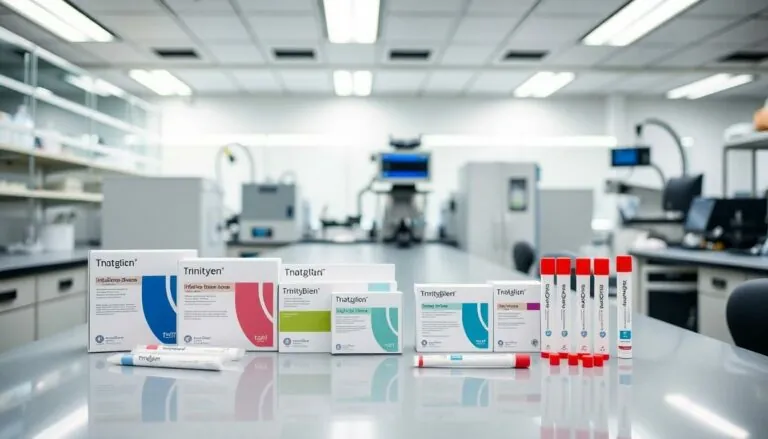Table of Contents
ToggleIn a world where science fiction is becoming reality, AI biotech stands at the forefront of a revolution. Imagine a lab where robots don’t just mix potions but also analyze data faster than you can say “genetic modification.” With artificial intelligence powering breakthroughs in biotechnology, the potential to enhance health, agriculture, and even environmental sustainability is limitless.
Overview of AI Biotech
AI biotech combines advanced artificial intelligence techniques with biotechnology to enhance research and development processes. This integration streamlines experimentation, data analysis, and predictive modeling, which increases the efficiency of biotechnological innovations. Robots are capable of executing complex experiments autonomously, allowing researchers to focus on interpreting results.
Biotech applications span several fields, such as healthcare, agriculture, and environmental science. In healthcare, AI aids drug discovery by analyzing vast datasets to identify potential therapeutic compounds. Agriculture benefits from AI through improved crop management and precision farming, where data-driven insights optimize yield and resource use.
Environmental sustainability experiences a boost from AI biotech as well. Innovations in waste management and bioremediation leverage machine learning algorithms to provide solutions for pollution control. By monitoring environmental trends, AI enables timely interventions, making it valuable for ecological conservation efforts.
AI biotech has also led to significant advancements in personalized medicine. Algorithms analyze patient data to tailor medical treatments based on individual genetic profiles, which enhances treatment efficacy. Such tailored approaches mark a shift towards more precise and effective healthcare solutions.
Industry collaborations play a crucial role in advancing AI biotech. Partnerships between tech companies and biotech firms facilitate the sharing of knowledge and resources, driving innovation. Together, they create robust platforms that not only accelerate research but also promote the responsible use of biotechnological advancements.
Establishing regulatory frameworks is essential for the growth of AI biotech. Regulatory bodies must adapt to accommodate rapid advancements while ensuring safety and efficacy of new technologies. This adaptation ensures a balanced approach to innovation and public health safeguards.
AI biotech stands on the cusp of revolutionizing various sectors, unlocking unprecedented potential for growth, efficiency, and sustainability.
Applications of AI in Biotechnology
AI transforms biotechnology by streamlining processes in several key areas, including drug discovery, genomic analysis, and personalized medicine.
Drug Discovery
AI accelerates drug discovery by analyzing vast datasets to pinpoint promising compounds. Machine learning algorithms identify molecular interactions and predict efficacy much faster than traditional methods. Technologies such as deep learning enhance predictive modeling for drug-target interactions, increasing the success rate in early trials. Biotech companies leverage AI to optimize clinical trial design, reducing time and costs. Significant breakthroughs arise from AI’s ability to mine existing research to uncover insights that human researchers might overlook.
Genomic Analysis
Genomic analysis sees significant advancements due to AI’s processing capabilities. Sophisticated algorithms sort through massive genomic datasets, enabling rapid identification of genetic variants linked to diseases. Researchers apply AI in understanding complex genetic interactions and predicting phenotypic outcomes. This approach allows for quicker identification of potential therapeutic targets and accelerates research in genetic engineering. AI-powered tools enhance the accuracy of genome sequencing, contributing to improved diagnostics and treatment strategies.
Personalized Medicine
Personalized medicine benefits greatly from AI technologies tailored to individual genetic profiles. With AI, healthcare providers rapidly analyze patient data to create customized treatment plans. This methodology improves treatment efficacy by ensuring therapies align with patients’ unique genetic makeup. AI’s predictive models assess the likelihood of treatment responses, minimizing trial-and-error approaches. Additionally, integration of AI in clinical workflows fosters collaboration among healthcare professionals, enhancing decision-making processes for patient care.
Benefits of Implementing AI in Biotech
AI in biotech offers transformative advantages across research and development, enhancing productivity and innovation. Organizations increasingly rely on AI to streamline their processes and improve outcomes in various sectors.
Increased Efficiency
Automation of routine tasks significantly boosts laboratory efficiency. Robotic systems execute complex experiments without human intervention, allowing scientists to concentrate on data interpretation. Adaptive machine learning algorithms analyze experimental results in real-time, providing insights faster than traditional methods. Additionally, AI-driven platforms can predict experiment outcomes, reducing unnecessary trials. Organizations that integrate these technologies experience faster project timelines, directly impacting research progress and product development.
Cost Reduction
AI lowers operational costs through optimized resource allocation. By automating repetitive tasks, labs minimize the need for extensive manpower, leading to reduced labor expenses. Enhanced data analysis capabilities shorten drug discovery timelines, ultimately leading to significant savings on research and trials. Organizations also reduce material waste through predictive modeling, maximizing resource efficiency. Improved accuracy in targeting therapeutic compounds lowers the risk of costly failures in clinical trials, further contributing to substantial budgetary savings.
Challenges and Limitations of AI Biotech
Implementing AI in biotech faces significant challenges, influencing its potential impact across various sectors. The limitations stem from issues like data privacy and algorithm bias.
Data Privacy Concerns
Data privacy remains a pivotal concern in AI biotech. Sensitive health information often gets utilized for training algorithms, raising ethical questions about consent and data security. Researchers must ensure that patient data remains confidential, as breaches can lead to serious consequences. Regulations such as HIPAA govern the handling of health data, but compliance can become complex in AI projects. Biotech firms must adopt robust security measures to protect data integrity while leveraging AI’s capabilities.
Algorithm Bias
Algorithm bias presents a critical challenge for AI systems in biotechnology. These biases can emerge from unrepresentative training datasets, leading to skewed results in drug discovery or genomic analysis. When algorithms reflect existing inequalities in the data, vulnerable populations may receive less effective treatments. Addressing these biases requires diverse datasets and continuous monitoring of AI outputs. Developers must prioritize fairness to build trust and improve health outcomes for all demographic groups.
Future Trends in AI Biotech
AI biotech is poised for significant transformation through several emerging trends. One notable trend involves enhanced computational capabilities. These will enable faster and more accurate simulations in drug discovery and genomic analysis. Advanced algorithms can process complex datasets, facilitating the identification of promising compounds and genetic variants more efficiently.
In personalized medicine, AI technology will likely shape treatment plans to individual needs. Tailoring therapies based on genetic profiles can lead to improved patient outcomes and greater collaboration among healthcare providers. Various studies support this, demonstrating the effectiveness of AI-driven approaches in creating precision medicine strategies.
Sustainability efforts will benefit from AI innovations. Machine learning applications can optimize resource management in agriculture, increasing crop yields while minimizing environmental impact. Innovations in waste management and pollution control will enhance ecological conservation, making agriculture more sustainable.
Cybersecurity measures are vital for protecting sensitive health data. Prioritizing data integrity is crucial as biotech companies integrate AI solutions. Implementing robust security protocols will address privacy concerns and ensure ethical AI use in biotechnology.
Industry collaborations will foster innovation, blending expertise from tech and biotech sectors. Partnerships between these organizations will likely accelerate advancements and develop responsible applications of AI in biotech. Continuous dialogue among stakeholders will create a supportive ecosystem for innovation.
Regulatory frameworks will evolve to keep pace with advancements. Policymakers must adapt to the rapid integration of AI technologies while prioritizing safety and efficacy in biotech applications. A proactive approach will ensure the responsible adoption of AI-driven solutions across the industry.
AI biotech is poised to reshape the future of health agriculture and environmental sustainability. The integration of artificial intelligence into biotechnology not only enhances research efficiency but also paves the way for groundbreaking innovations. As AI continues to evolve it promises to deliver personalized medicine and optimize resource management while addressing critical challenges like data privacy and algorithm bias.
The collaboration between tech and biotech industries will be essential in driving responsible advancements. With the right regulatory frameworks in place AI biotech can unlock unprecedented potential for growth and sustainability. The journey ahead is filled with opportunities that could fundamentally change how society approaches health and environmental challenges.





